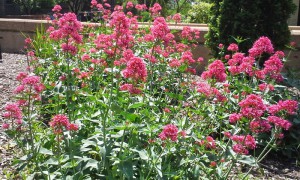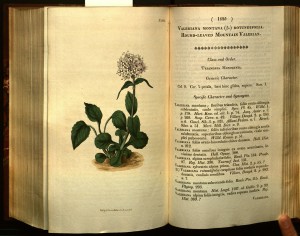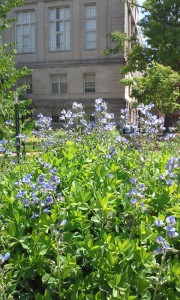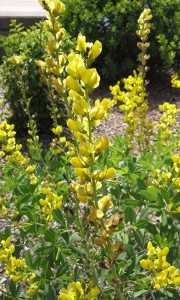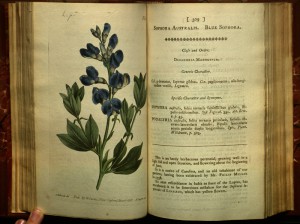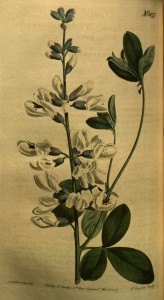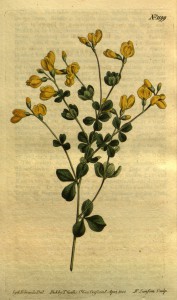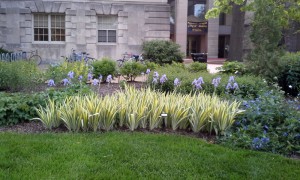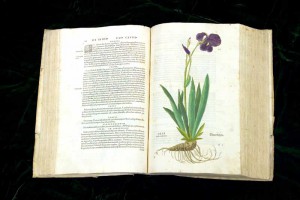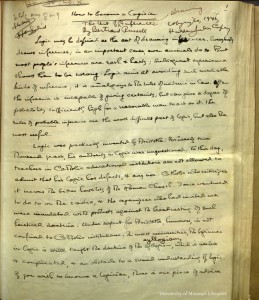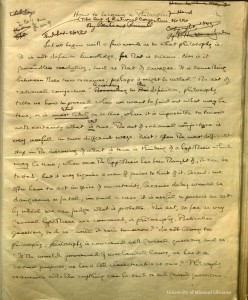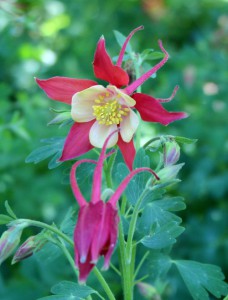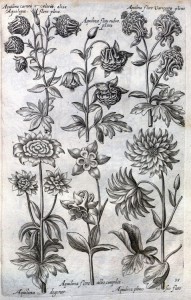Manuscript Monday has moved to our Tumblr! We'll be sharing manuscripts available through the Digital Scriptorium database all summer. Go follow us there, and check out the beautful materials from Special Collections and Archives at Mizzou – and also from other libraries around the world.
Resources and Services
What’s Blooming this Week: Red Valerian
Not far from the false indigo we featured last week, just outside the west entrance to Ellis Library, there's a beautiful red valerian in full bloom. The scientific name for this plant is Centranthus ruber. It's also called Jupiter's Beard or spur valerian.
While red valerian is a member of the family Valerianaceae, it's not really a valerian. True valerian is known scientifically today as Valeriana officinalis. Its roots were used medicinally and were thought to have a sedative effect. Centranthus ruber has no known medicinal uses, although some sources claim it's edible. I didn't try it, and I don't advise you to, either!
In the past, Centranthus ruber and a few other members of its genus were thought to be closer relatives of true valerian than scientists believe they are today. In 1816, the plant was published in Curtis's Botanical Magazine with a list of various other Valeriana species. The plant pictured here, identified as Valeriana montana rotundifolia, is now known as Centranthus calcitrapa. It is a hardy perennial, native to southern Europe.
This post wraps up our weekly series celebrating the connections between our collections and the Mizzou Botanic Garden – for now, at least. I'll continue to use Special Collections to research the plants around us periodically over the summer and fall. Have you seen a plant on campus or elsewhere that you'd like us to feature? If so, let me know!
What’s Blooming this Week: False Indigo
We're visiting the west entrance of Ellis Library again this week to see what's blooming in the Mizzou Botanic Gardens just outside our doors. This week, it's the spiky blooms of false indigo, or Baptisia. We have two different varieties growing here on campus, yellow and blue. Both types of false indigo were once used to make dye, but they aren't related to true indigo, which yields a very dark blue dye.
Baptisia australis, the blue-flowering species, is native to the southeastern and midwestern United States. It was illustrated in Curtis's Botanical Magazine in 1800, and there it was listed under the names Sophora australis and Podalyria australis, along with the following note: "It is a native of Carolina, and an old inhabitant of our gardens, having been cultivated by Mr. Philip Miller in 1758." By the time the white-flowered species was illustrated in 1808, the genus Podalyria had been separated from Sophora. The yellow false indigo we have here is a hybrid cultivar, but Curtis also includes a couple of other Baptisia species native to the Midwest: a yellow false indigo now called Baptisia tinctoria, and a white species, Baptisia alba.
Register Now for May 29 & 30 Online Research Workshops
Thursday, May 29 & Friday, May 30, 2014
REGISTER: To register click on specific workshop: https://libraryguides.missouri.edu/upcomingclassesworkshops
Thursday & Friday: All Workshops take place online using Blackboard Collaborate
__________________________________
Thursday May 29, 9:00-10:30 AM [ONLINE]
· Literature Review & Beyond: Tips & Tricks for Research
Learn some of the more sophisticated features of database searching to yield the results you want. Using a variety of databases, we'll focus on practical techniques that can save you time and effort.
Goodie Bhullar, Library Instruction Coordinator; Rachel Brekhus, Humanities Librarian
Thursday May 29, 11:00-11:30 AM [ONLINE]
· Stay Current with Browzine!
Easily read and follow your favorite scholarly journals from the MU Libraries with Browzine from your iPad or Android tablet.
Rhonda Whithaus, Electronic Resources Coordinator
Friday May 30, 1:00-2:30 PM [ONLINE]
· Creating Bibliographies with Zotero
Zotero is a free, simple, open-source tool for organizing, managing and formatting bibliographic citations. Learn to extract citations from PDFs and web pages at the click of a button, and create in-text references and bibliographies.I I
Rachel Brekhus, Humanities Librarian
Friday May 30, 3:00-4:30 PM [ONLINE]
· Creating Bibliographies with EndNote
EndNote is a powerful program for storing citation data and producing in-text citations and bibliographies in a plethora of formats. Learn how to put this tool to work for your academic writing.
Mike Muchow, Humanities Librarian; Ashley Nelson, Science Librarian
Questions: Goodie Bhullar, bhullarp@missouri.edu
More online access to Vaccine & Veterinary Parasitology
We've recently added more "backfile" access to two ScienceDirect journals. You now have online access to Vaccine and to Veterinary Parasitology back to 1995 (previously, access was available back to 1998).
Enjoy!
Bookmark Cafe Closed May 19-June 2
The Bookark Café will be closed for renovation from May 19th to June 2.
What’s Blooming this Week: Iris
It's been unseasonably chilly here in Columbia this week, but that means the irises blooming all over town have been an even more welcome sight. There's a beautiful planting of Iris pallida 'Argentea Variegata' near the west entrance to the library, and I captured it on my walk into the building this morning. There are many different species of iris growing across the northern hemisphere. According to the Missouri Botanical Garden, Iris pallida is native to Croatia and the southern Alps, and it has a sweet fragrance. The variegated subspecies growing on campus here has striped leaves of pale green and cream.
In 1542, the physician and botanist Leonhart Fuchs included a different iris species in his herbal, De Historia Stirpium Commentarii Insignes, which is part of a long tradition of books that describe plants and their medicinal uses. Although Fuchs wasn't interested in the plants' ornamental value, he hired three professional artists to illustrate the herbal to the highest degree of naturalism. Fuchs wanted physicians to be able to use the book to identify medicinal plants, and the resulting publication is filled with detailed, hand-colored illustrations that depict species both familiar and exotic. Iris germanica, illustrated below, is probably native to southern Europe, and it is the ancestor of most garden irises today.
Congratulations to the Class of 2014!
After you graduate, the MU Libraries will still be here to serve you. To find out more about the resources available to alumni, visit Library Resources for Alumni.
All of us at the MU Libraries, wish you the very best in your future endeavors!
Monday Manuscript: Bertrand Russell tells you how to be a philosopher
The semester's last manuscript of the week is from philosopher Bertrand Russell, whose birthday is on the 18th. These three original manuscripts contain the text of "How to become a philosopher," "How to become a logician," and "How to become a mathematician." They were later published in one volume by Haldeman-Julius Publications as nos. 7, 8, and 9 of The How-to series in 1942. E. Haldeman-Julius donated them to the Philosophy Section of the Missouri Academy of Science in March 1943. Find it in the MERLIN catalog.
What’s Blooming this Week: Columbine
Right across Lowry Mall from the tulips I posted a couple of weeks ago, and under the magnolias that kicked off this series, there's a beautiful bed of columbine in full bloom.
Columbines are part of the genus Aquilegia and grow wild throughout the nothern hemisphere. The ones in the Mizzou Botanic Garden are derived from the species Aquilegia vulgaris, also known as European Columbine. This week's illustration is from Johann Theodor de Bry's Florilegium renovatum et auctum (1641), an updated version of his Florilegium novum with engravings by his son-in-law, Matthäus Merian. Some of the flowers on this page have double blossoms, and you can still find this type of hybrid columbine under cultivation. The recognizable spurred bloom of the columbine appears right in the middle of the page.
Merian's daughter, Maria Sybilla Merian, would go on to become an accompished artist and naturalist herself. Check out Julie Christenson's blog post about her for more information and some beautiful images.
